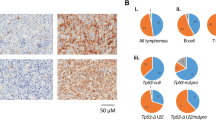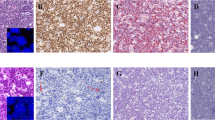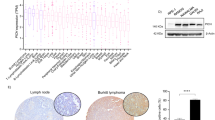Abstract
Burkitt's lymphomas (BLs) are characterized by an activated MYC gene that provides a constitutive proliferative signal. However, activated myc can initiate ARF-dependent activation of p53 and apoptosis as well. Data derived from cell culture and animal models suggest that the inactivation of the ARF–MDM-2–p53 apoptotic signaling pathway may be a necessary secondary event for the development of BL. This has not been tested in freshly excised BL tissue. We investigated the ARF–MDM-2–p53 pathway in tumor specimen from 24 children with sporadic BL/B-ALL. Direct sequencing revealed a point mutation in the p53 gene in four BL. Overexpression of MDM-2 was evident in 10 of the BL samples analyzed by real-time quantitative PCR. Deletion of the CDKN2A locus that encodes ARF or reduced expression of ARF could not be detected in any BL by fluorescence in situ hybridization analysis or real-time quantitative PCR, respectively. Our results indicate that the ARF–MDM-2–p53 apoptotic pathway is disrupted in about 55% of the cases of childhood sporadic BL. We suggest that in addition to the inactivation of the ARF–MDM-2–p53 protective checkpoint function other antiapoptotic mutations may occur in a substantial part of children with sporadic BL.
This is a preview of subscription content, access via your institution
Access options
Subscribe to this journal
Receive 12 print issues and online access
$259.00 per year
only $21.58 per issue
Buy this article
- Purchase on Springer Link
- Instant access to full article PDF
Prices may be subject to local taxes which are calculated during checkout



Similar content being viewed by others
References
Dang CV, Resar LM, Emison E, Kim S, Li Q, Prescott JE et al. Function of the c-Myc oncogenic transcription factor. Exp Cell Res 1999; 253: 63–77.
Dang CV . c-Myc target genes involved in cell growth, apoptosis, and metabolism. Mol Cell Biol 1999; 19: 1–11.
Hecht JL, Aster JC . Molecular biology of Burkitt's lymphoma. J Clin Oncol 2000; 18: 3707–3721.
Boxer LM, Dang CV . Translocations involving c-myc and c-myc function. Oncogene 2001; 20: 5595–5610.
Evan GI, Wyllie AH, Gilbert CS, Littlewood TD, Brooks M, Water CM et al. Induction of apoptosis in fibroblasts by c-myc protein. Cell 1992; 69: 119–128.
Henriksson M, Selivanova G, Lindstrom M, Wiman KG . Inactivation of Myc-induced p53-dependent apoptosis in human tumors. Apoptosis 2001; 6: 133–137.
Hermeking H, Eick D . Mediation of c-Myc-induced apoptosis by p53. Science 1994; 265: 2091–2093.
Sherr CJ . Tumor surveillance via the ARF-p53 pathway. Genes Dev 1998; 12: 2984–2991.
Sherr CJ, Weber JD . The ARF/p53 pathway. Curr Opin Genet Dev 2000; 10: 94–99.
Zindy F, Eischen CM, Randle DH, Kamijo T, Cleveland JL, Sherr CJ et al. Myc signaling via the ARF tumor suppressor regulates p53-dependent apoptosis and immortalization. Genes Dev 1998; 12: 2424–2433.
Kamijo T, Weber JD, Zambetti G, Zindy F, Roussel MF, Sherr CJ . Functional and physical interactions of the ARF tumor suppressor with p53 and Mdm2. Proc Natl Acad Sci USA 1998; 95: 8292–8297.
Pomerantz J, Schreiber-Agus N, Liegeois NJ, Silverman A, Alland L, Chin L et al. The Ink4a tumor suppressor gene product, p19Arf, interacts with MDM2 and neutralizes MDM2's inhibition of p53. Cell 1998; 92: 713–723.
Zhang Y, Xiong Y, Yarbrough WG . ARF promotes MDM2 degradation and stabilizes p53: ARF-INK4a locus deletion impairs both the Rb and p53 tumor suppression pathways. Cell 1998; 92: 725–734.
Tao W, Levine AJ . P19(ARF) stabilizes p53 by blocking nucleo-cytoplasmic shuttling of Mdm2. Proc Natl Acad Sci USA 1999; 96: 6937–6941.
Zhang Y, Xiong Y . Mutations in human ARF exon 2 disrupt its nucleolar localization and impair its ability to block nuclear export of MDM2 and p53. Mol Cell 1999; 3: 579–591.
Weber JD, Taylor LJ, Roussel MF, Sherr CJ, Bar-Sagi D . Nucleolar Arf sequesters Mdm2 and activates p53. Nat Cell Biol 1999; 1: 20–26.
Weber JD, Kuo ML, Bothner B, DiGiammarino EL, Kriwacki RW, Roussel MF et al. Cooperative signals governing ARF-mdm2 interaction and nucleolar localization of the complex. Mol Cell Biol 2000; 20: 2517–2528.
Honda R, Yasuda H . Association of p19(ARF) with Mdm2 inhibits ubiquitin ligase activity of Mdm2 for tumor suppressor p53. EMBO J 1999; 18: 22–27.
Eischen CM, Weber JD, Roussel MF, Sherr CJ, Cleveland JL . Disruption of the ARF-Mdm2-p53 tumor suppressor pathway in Myc-induced lymphomagenesis. Genes Dev 1999; 13: 2658–2669.
Schmitt CA, McCurrach ME, de Stanchina E, Wallace-Brodeur RR, Lowe SW . INK4a/ARF mutations accelerate lymphomagenesis and promote chemoresistance by disabling p53. Genes Dev 1999; 13: 2670–2677.
Yu D, Thomas-Tikhonenko A . A non-transgenic mouse model for B-cell lymphoma: in vivo infection of p53-null bone marrow progenitors by a Myc retrovirus is sufficient for tumorigenesis. Oncogene 2002; 21: 1922–1927.
Lindstrom MS, Klangby U, Wiman KG . p14ARF homozygous deletion or MDM2 overexpression in Burkitt lymphoma lines carrying wild type p53. Oncogene 2001; 20: 2171–2177.
Gaidano G, Ballerini P, Gong JZ, Inghirami G, Neri A, Newcomb EW et al. p53 mutations in human lymphoid malignancies: association with Burkitt lymphoma and chronic lymphocytic leukemia. Proc Natl Acad Sci USA 1991; 88: 5413–5417.
Bhatia KG, Gutierrez MI, Huppi K, Siwarski D, Magrath IT . The pattern of p53 mutations in Burkitt's lymphoma differs from that of solid tumors. Cancer Res 1992; 52: 4273–4276.
Klumb CE, de Resende LM, Tajara EH, Bertelli EC, Rumjanek VM, Maia RC . p53 gene analysis in childhood B non-Hodgkin's lymphoma. Sao Paulo Med J 2001; 119: 212–215.
Preudhomme C, Dervite I, Wattel E, Vanrumbeke M, Flactif M, Lai JL et al. Clinical significance of p53 mutations in newly diagnosed Burkitt's lymphoma and acute lymphoblastic leukemia: a report of 48 cases. J Clin Oncol 1995; 13: 812–820.
Sanchez-Beato M, Saez AI, Navas IC, Algara P, Sol Mateo M, Villuendas R et al. Overall survival in aggressive B-cell lymphomas is dependent on the accumulation of alterations in p53, p16, and p27. Am J Pathol 2001; 159: 205–213.
Baur AS, Shaw P, Burri N, Delacretaz F, Bosman FT, Chaubert P . Frequent methylation silencing of p15(INK4b) (MTS2) and p16(INK4a) (MTS1) in B-cell and T-cell lymphomas. Blood 1999; 94: 1773–1781.
Pinyol M, Hernandez L, Martinez A, Cobo F, Hernandez S, Bea S et al. INK4a/ARF locus alterations in human non-Hodgkin's lymphomas mainly occur in tumors with wild-type p53 gene. Am J Pathol 2000; 156: 1987–1996.
Stranks G, Height SE, Mitchell P, Jadayel D, Yuille MA, De Lord C et al. Deletions and rearrangement of CDKN2 in lymphoid malignancy. Blood 1995; 85: 893–901.
Wiman KG, Magnusson KP, Ramqvist T, Klein G . Mutant p53 detected in a majority of Burkitt lymphoma cell lines by monoclonal antibody PAb240. Oncogene 1991; 6: 1633–1639.
Vousden KH, Crook T, Farrell PJ . Biological activities of p53 mutants in Burkitt's lymphoma cells. J Gen Virol 1993; 74: 803–810.
Farrell PJ, Allan GJ, Shanahan F, Vousden KH, Crook T . p53 is frequently mutated in Burkitt's lymphoma cell lines. EMBO J 1991; 10: 2879–2887.
Cherney BW, Bhatia KG, Sgadari C, Gutierrez MI, Mostowski H, Pike SE et al. Role of the p53 tumor suppressor gene in the tumorigenicity of Burkitt's lymphoma cells. Cancer Res 1997; 57: 2508–2515.
Olivier M, Eeles R, Hollstein M, Khan MA, Harris CC, Hainaut P . The IARC TP53 Database: new online mutation analysis and recommendations to users (Version R7, Sept. 2002). Hum Mutat 2002; 19: 607–614.
Capoulade C, Bressac-de Paillerets B, Lefrere I, Ronsin M, Feunteun J, Tursz T et al. Overexpression of MDM2, due to enhanced translation, results in inactivation of wild-type p53 in Burkitt's lymphoma cells. Oncogene 1998; 16: 1603–1610.
Lindstrom MS, Wiman KG . Role of genetic and epigenetic changes in Burkitt lymphoma. Semin Cancer Biol 2002; 12: 381–387.
Reiter A, Schrappe M, Tiemann M, Ludwig WD, Yakisan E, Zimmermann M et al. Improved treatment results in childhood B-cell neoplasms with tailored intensification of therapy: a report of the Berlin–Frankfurt–Munster Group Trial NHL-BFM 90. Blood 1999; 94: 3294–3306.
Acknowledgements
We thank Dr WD Ludwig (Berlin, Germany) for providing frozen bone marrow or tumor tissue. Simone Schwalm and Steffanie Garkisch provided expert technical assistance. This work was supported by the McDonalds Kinderhilfe and the Forschungshilfe Station Peiper.
Author information
Authors and Affiliations
Corresponding author
Rights and permissions
About this article
Cite this article
Wilda, M., Bruch, J., Harder, L. et al. Inactivation of the ARF–MDM-2–p53 pathway in sporadic Burkitt's lymphoma in children. Leukemia 18, 584–588 (2004). https://doi.org/10.1038/sj.leu.2403254
Received:
Accepted:
Published:
Issue Date:
DOI: https://doi.org/10.1038/sj.leu.2403254
Keywords
This article is cited by
-
Recurrent mutation of the ID3 gene in Burkitt lymphoma identified by integrated genome, exome and transcriptome sequencing
Nature Genetics (2012)
-
Activation of p53 by MDM2 antagonists has differential apoptotic effects on Epstein–Barr virus (EBV)-positive and EBV-negative Burkitt's lymphoma cells
Leukemia (2009)
-
Specific cytogenetic abnormalities are associated with a significantly inferior outcome in children and adolescents with mature B-cell non-Hodgkin's lymphoma: results of the FAB/LMB 96 international study
Leukemia (2009)
-
Elevated Mdm2 expression induces chromosomal instability and confers a survival and growth advantage to B cells
Oncogene (2008)
-
Mechanisms involved in Burkitt’s lymphoma tumor formation
Clinical and Translational Oncology (2008)



